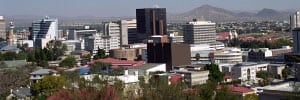RISING STAR
By Dan Keeler
Namibia’s fortunes may be about to change dramatically.

Sandwiched between regional titans South Africa and Angola, Namibia is better known for its colossal sand dunes and the jagged carcasses of ships that have foundered on its infamous Skeleton Coast than for its economy or investment opportunities. One thing could change all that: oil. Recent surveys have shown Namibia’s offshore geology could rival the biggest oil discoveries of recent years. A plethora of oil companies, including Brazil’s HRT, which is investing some $250 million to search for oil off the Namibian coast, are betting the unexplored fields will yield billions of barrels.
Even without its oil prospects, Namibia has quietly established itself as an attractive investment destination. A recent Bloomberg Markets study placed Namibia among the world’s 20 most attractive emerging markets from an investment standpoint.
Part of the credit for Namibia’s presence in the top tier of emerging markets is due to the government’s determination to provide a welcoming environment for investors. HRT’s experience is telling: “We have only good things to say about Namibia,” says Wagner Peres, CEO of HRT America, a subsidiary of HRT Brazil, who is in charge of the Namibian project. “Working with Namibian officials has been great. They are very capable, very professional and react quickly to our requests,” he adds. Other multinationals investing in Namibia offer similarly glowing reports, although some grumble that the process of setting up a business can be slow.
If oil is found in recoverable quantities off the coast of Namibia, it is likely to have a very different impact than similar discoveries in other African countries. Namibia has been both politically and economically stable since achieving independence in 1990 and, compared to many other countries in Sub-Saharan Africa, has a relatively diversified economy. As a consequence, says Britain’s high commissioner to Namibia, Marianne Young: “Namibia offers plenty of opportunities [for foreign investors], such as the mineral potential, agriculture potential and tourism potential.” She also points to its growing market economy, good infrastructure, macroeconomic stability and low levels of government debt and notes that, with its proximity to South Africa and Angola, it could serve as a regional base.
The structure of the business environment is another factor in encouraging investment, says Andrew Sekandi, a senior consultant covering Sub-Saharan Africa for global risk consultancy Control Risks. “Namibia has managed to create a stable regulatory and legal environment. Enforcing contracts can be slow, but relative to the region it is good,” he comments.
Although most recent developments are positive for potential investors, there are some changes that are causing concern, says Young: “While Namibia actively seeks foreign investment, some sectors have experienced aggressive ‘Namibianization’ of existing investments,” she notes. “In particular, some foreign companies with fishing and mining licenses in Namibia have alleged that they have been forced into partnerships with local individuals or firms, chosen by the government, in order to renew their licenses.”
With a small population and vast natural resources, Namibia has, not surprisingly, a relatively high GDP per capita of $5,635. It also has one of the world’s widest income disparities, with more than half the country’s 2.3 million people living on less than $2 a day. This yawning gap between rich and poor is presenting a growing challenge to the government of president Hifikepunye Lucas Pohamba, who has been in power since 2005. According to Sekandi, the government has made some progress in narrowing the income gap, but social tensions continue to grow. “The government is … maybe not addressing it quickly enough.”
| Location | Southwest Africa |
| Neighbors | South Africa, Angola, Botswana, Zambia |
| Capital city | Windhoek |
| Population | 2.3 million |
| Official language | English |
| GDP per capita | $5,635* |
| GDP growth 2012 | 4.04%* |
| Inflation 2012 | 6.7%* |
| Currency | Namibian dollar |
| Investment promotion agency | www.ndc.org.na |
| Investment incentives available? | Yes |
| Ease of Doing Business rank | 87th of 185 globally, 7th of 46 in Sub-Saharan Africa** |
| Corruption Perceptions Index rank | 58th of 176 globally*** |
| Political risk | Low**** |
| Security risk | Low**** |
| Politically stable and business-friendly government |
| Steadily growing economy |
| Clear, reliable legal system |
| Good transportation infrastructure |
| Low population density |
| Warm, dry climate |
| Shortage of skilled labor |
| Some sectors have experienced aggressive “Namibianization” |
| High levels of HIV/AIDS |
| Difficult to obtain permits for foreign workers |
| Bureaucracy can be slow |
| Electricity supply dependent on imports |
Sources: * IMF World Economic Outlook Database ** World Bank ***Transparency International ****Control Risks



